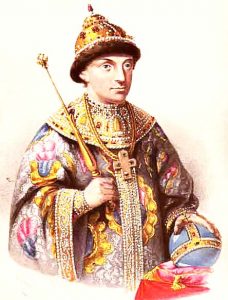(1676 – 1682)

After the death of Alexei Mikhailovich, the 14-year-old son of his Fyodor Alexeyevich, who had reigned for six years, ascended the throne.
He was a pupil of Simeon of Polotsk, a monk known for his studies, who for his time was an educated person, he knew Polish and Latin languages.
With the accession to the throne of Theodore, the Miloslavskyses again received the former influence and tried to remove Matveyev, who was exiled to Pustozersk. Two Naryshkins were also exiled, and Natalya Kirillovna and Peter went to the village of Preobrazhenskoye.
Under Fyodor Alekseevich, the war continued for Little Russia, in the southern part of which Doroshenko was held, who surrendered under Turkey’s protection, as a result of which Turkey considered the whole of Ukraine its own.
This war with Turkey ended in 1681 with a 20-year truce in Bakhchisaray. Under the peace treaty, Eastern Malorossia and Zaporozhye were forever affirmed for Moscow, and western Ukraine withdrew to Turkey.
Fedor Alekseevich proposed the transformation of the army in order to abolish the localism, i.e. the custom of Moscow boyars to be considered an ancestral service when taking up places in military and civil services, in court ceremonies and at the royal table. Mestnichestvo brought great harm, as it was necessary to appoint to high places by the nobility of the clan, and not by merit and ability.
So, in 1682, in a meeting of the Boyar Duma, it was decided to destroy the localism. Discharge books, which recorded all orders of the government for military and civil services, were burned. At the same time, the tsar ordered that noble families be included in special genealogical books for the memory of the offspring.
Tsar Feodor died childless.